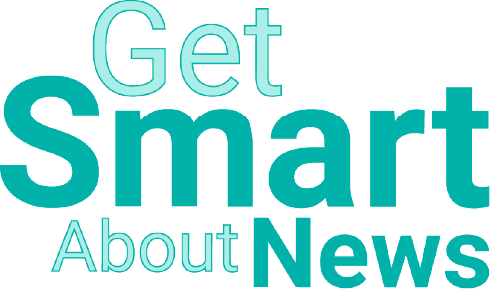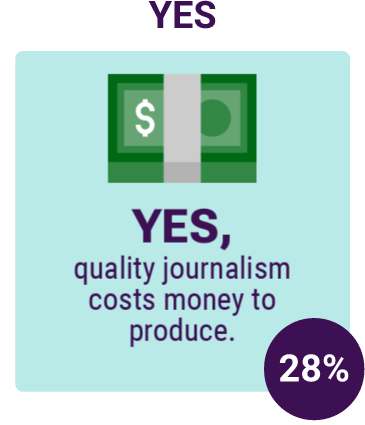GSAN: News influencers | Fragmented media

Nov. 19, 2024
Subscribe to this newsletter.

Your guide to helping young
people get smart about news.
In this issue
News influencers | Fragmented media
Top picks
{{Salutation or 'Reader'}}, this section highlights the latest news literacy topics and ways for you to engage with the kids in your life.

| News organizations need funds to operate, but paywalls can make vital information less accessible. |
1. Should news sites have paywalls?
Credible information is vital to countering misinformation, but paywalls on standards-based news websites can prevent readers from accessing it. About 30% to 40% of U.S. news sites use paywalls, according to misinformation expert Claire Wardle, a professor at Cornell University. Wardle said in an interview that paywalls are a barrier to the dissemination of quality journalism at a time when the information landscape has changed — including with the rise of low-quality, freely available, AI-generated “pink slime” sites. The growing popularity of social media platforms and podcasts as sources of information in the past decade, as well as the decline of ad revenue, has also affected news organizations.
CNN and Reuters — for-profit news organizations — are among the news outlets that have recently added paywalls to their sites. While news organizations need funding to operate and many — especially local newsrooms — are struggling to survive financially, Wardle suggested making news about political and social issues free. Some news outlets have hard paywalls that require readers to subscribe to access information, but others have soft paywalls that allow readers to access a certain number of articles for free before they’re asked to pay.
| Note: |
Wardle has volunteered her time in support of the News Literacy Project, including by serving as the host of the Misinformation lesson on NLP’s Checkology® virtual classroom.
| Engage: |
Ask the kids in your life about paywalls. Do you they ever encounter news paywalls? Where do they turn for information if they encounter a paywall? How could news paywalls indirectly cause false and misleading information to spread? What might some costs and consequences be for communities that lack credible local news sources?
| Related: |
- “The Paywall Gambit” (Columbia Journalism Review).
★ Tool for the talk:
2. News media has become more fragmented
The way people tuned into election news this year is growing more fragmented compared with the 2016 election, back when most Americans followed major news networks and publishers. Some online creators are seeing the same viewership numbers as major news outlets — like TikTok news influencer Dylan Page, whose video calling the presidential election results had over 6 million views, about the same as MSNBC’s average live broadcast numbers on Election Day. A new Pew Research Center study found that about 1 in 5 U.S. adults say they regularly get news from news influencers on social media. Americans also turned to podcasts, X, Instagram, Twitch and Facebook for election news.
| Engage: |
Ask the young people in your life to reflect on how they got election news. Did they turn to news influencers for updates? How can they determine whether a news source is credible?
| Related: |
- “Trump’s Win Cemented It: New Media Is Leaving the Old Guard Behind” (The Wall Street Journal).
- “‘Affirmation Instead of Information’: Katie Couric Talks Role of Media in Election at IOP Forum” (The Harvard Crimson).
★ Tool for the talk:


Poster: “What Is News?”
3. Want to be an influencer? There’s a degree for that
Influencers have become a major source of news for young people — and a popular career aspiration among Gen Z. A university in Ireland is responding to this high interest by offering a degree in content creation and social media, with courses on video storytelling, data analytics and celebrity studies.
Many young people view influencers as trusted information sources, especially compared with journalists. About 8 in 10 teens say that news organizations produce information that is either more biased than or about the same as content creators online, according to a recent NLP survey.
| Engage: |
Ask your teen about influencers. Are there any influencers they follow? Do they trust influencers to get news? What ethical responsibilities do journalists and influencers have when they share information? How are they alike? How are they different? How can influencers responsibly disclose advertising?
| Related: |
- “UTSA offers influencer degree” (Texas Public Radio).
- “AI travel influencers are here. Human travelers hate it.” (The Washington Post).
- “This ‘Wall Street Girly’ Wants to Make Wealth More Accessible” (The New York Times).
- Note: NLP Senior Vice President of Research and Design Peter Adams is quoted in this article.
★ Tool for the talk:


Poster: “Six zones of information.”


No, Musk’s Starlink wasn’t used to alter vote tallies


❌ NO: Elon Musk’s Starlink satellites were not used to manipulate or change votes in swing states during the 2024 presidential election.
✅ YES: Georgia, Pennsylvania and other swing states don’t allow voting equipment to be connected to the internet during ballot counting.
✅ YES: Federal officials say they have no evidence of any vote tampering in the election.
★ NewsLit takeaway
People can be vulnerable to conspiracy theories when they are confronted with a reality they do not want to accept. Some opponents of President-elect Donald Trump found it difficult to believe that he legitimately won the election and searched online for alternative explanations, finding conspiracies that fit their beliefs.
Here are a few tips to avoid this kind of thinking and stay grounded when news breaks:
Recognize that memes are not news. Social media posts do not go through the same vetting process as reports from standards-based news outlets.
Search for trusted sources. Credible claims of election fraud would draw attention from local officials, federal government agencies and news outlets, and would not appear only on social media.
Pause and consider. Content that aligns with preconceived beliefs can easily slip by unscrutinized, so be sure to double-check the origin of a claim before sharing it.


| Feeling the need for a news reset? This journalist says she’s taking a few steps to change the ways she reads the news, including by resubscribing to print newspapers to seek out coverage herself rather than read other peoples’ reaction to news on social media. | |
| The social media app Bluesky has seen a surge in growth, doubling to over 15 million users as many X users fled the Elon Musk-owned platform in search of an alternative after the election. | |
| A small but vocal online group of Vice President Kamala Harris supporters have turned to baseless conspiracy theories about the election being stolen or hacked. | |
| Public health experts are voicing concerns after anti-vaccination activist Robert F. Kennedy Jr. was nominated to lead the Department of Health and Human Services. One epidemiologist said sowing doubt about vaccines could impact “Americans' ability to make evidence-based decisions.” | |
| The famous voice of British naturalist Sir David Attenborough is one of the latest targets of artificial intelligence cloning, with Attenborough telling the BBC he was “profoundly disturbed” by the AI voice imitation. | |
| A teen reporter. A parent activist. An internet expert. Each expressed sharply different views to The Associated Press about a closely watched plan proposed by the Australian government to ban social media platforms for children under 16. | |
| The satirical website The Onion bought Alex Jones’ Infowars in a bankruptcy auction and said it plans to relaunch the site — which frequently pushed harmful conspiracy theories — as a parody of conspiracy theorists. (And nope, this isn’t satire.) |
Thanks for reading!
Your weekly issue of Get Smart About News is created by Susan Minichiello (@susanmini.bsky.social), Dan Evon (@danieljevon), Peter Adams (@peteradams.bsky.social), Hannah Covington (@hannahcov.bsky.social) and Pamela Brunskill (@PamelaBrunskill). It is edited by Mary Kane (@mk6325.bsky.social) and Lourdes Venard (@lourdesvenard.bsky.social).
For more tips on talking with kids about news literacy, take a look back at previous Get Smart About News issues in the archives.




